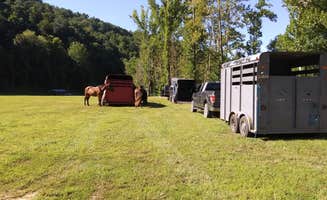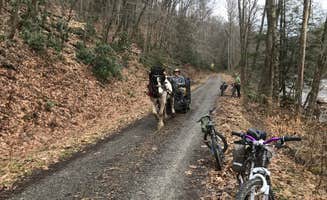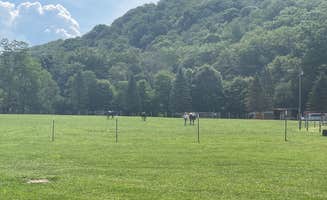Equestrian camping near Walkersville, West Virginia offers riders access to dense mountain forests with elevations ranging from 2,000 to 3,000 feet. The region receives approximately 48 inches of annual rainfall, creating lush vegetation and numerous streams for water access. Most equestrian campgrounds operate from April through November with closures during winter months due to mountain road conditions.
What to do
Trail riding on bridle paths: At Kumbrabow State Forest, located at 3,000 feet elevation, riders can access multiple wilderness trails. "As most campgrounds in West Virginia, there is no straight, easy way to get there from here. But...you will be glad you made the extra effort," notes Dave V. The forest offers secluded riding with minimal crowds.
Fishing along camp routes: The Cranberry River Sites provide access to stocked and wild trout fishing. "The fishing here is the best around with beautiful waterfalls like big ruff and the ducks are so colorful like no other," explains Jamie H. Many trails follow alongside the river, allowing riders to combine fishing with horseback trips.
Visit scenic waterfalls: Multiple waterfall sites are accessible via horseback throughout the region. "They have a total of 4 waterfalls to explore," mentions Hannah V. about park options. Some falls require dismounting and short hikes from hitching areas, with most concentrated in the eastern portion of the county.
What campers like
Riverside campsites: Many riders appreciate Camp Creek State Park for its water access. "The sites are right next to the creek which is very unique and beautiful. The sites are also big enough," notes Mark K. These sites provide natural water sources for horses and relaxing scenery for riders.
Privacy between sites: Campers value the space between camping areas for horses. "Each site is secluded and creek front. We stayed at the last site with the cliff over hang and it was magical," reports Sandra B. about Gandy Creek Dispersed Camping. Separated sites reduce stress for horses unfamiliar with each other.
Clean facilities: Despite rural locations, riders appreciate maintained facilities. "Bathrooms were good, store had basics, sites were decent size with a nice fire pit," notes Joe B. Most equestrian campgrounds offer basic amenities with weekly maintenance schedules, though water may need to be hauled to some primitive sites.
What you should know
Access challenges: Many equestrian sites require travel on gravel roads. "Long path along river, very beautiful area," explains Heather L. Sites at Laurel Fork Campground require more planning. "It takes forever on dirt forest service roads to finally stumble upon this place, making its beauty that much more enchanting," states Christopher B.
Weather considerations: The region experiences frequent rainfall. "Every morning and every night it rained which made it difficult to swim and fish. The park workers said this is common year round," reports Elaine L. Riders should bring appropriate rain gear and consider covered options for tack.
Limited connectivity: Cell service is minimal throughout the area. "No cell service at all for Verizon service, so a nice place to disconnect," mentions Cassia M. Emergency communications may require satellite phones or locator devices in remote areas.
Tips for camping with families
Junior rider trails: Several locations offer beginner-friendly riding paths for young equestrians. "This campground has plenty to offer for the whole family. The privacy of each site varies, on the weekends it is very busy though," explains Hannah V. Dedicated children's trails are typically shorter loops under 3 miles with minimal elevation changes.
Wildlife viewing opportunities: The region offers abundant wildlife viewing possibilities. "The amount of wildlife we saw throughout the day was incredible while biking the trail. Mostly deer, rabbit, chipmunks and Eastern Box Turtles sharing the trail...but we did see a few turkey, fox and bobcat," shares Dave V. about areas near Greenbrier River Trail.
Non-equestrian activities: For family members who don't ride, alternative activities exist. "They have basketball, tennis, and volleyball courts, and a pool for campers to enjoy," notes Hannah V. Most campgrounds maintain fishing access and short hiking trails for non-riders.
Tips from RVers
Trailer positioning challenges: Large horse trailers require advance planning for some sites. "Great Campground some spots a little tight for bigger camper we have a 30' but we were okay," advises Brett W. Backing larger rigs into riverside sites often requires spotters and patience.
Electric availability: Most equestrian sites offer limited electrical hookups. "We had a camp site that was right against the river with full hookups," shares Kevin C. about staying at Revelle's River Resort. Campers should verify amperage availability when reserving sites for horse trailers with living quarters.
Water and waste management: Horse-friendly campsites require special consideration for water access and waste disposal. "The sites have electric and at the shower house there is a spigot for fresh water," notes Cassia M. Manure disposal protocols vary by campground, with some providing dedicated collection areas.




